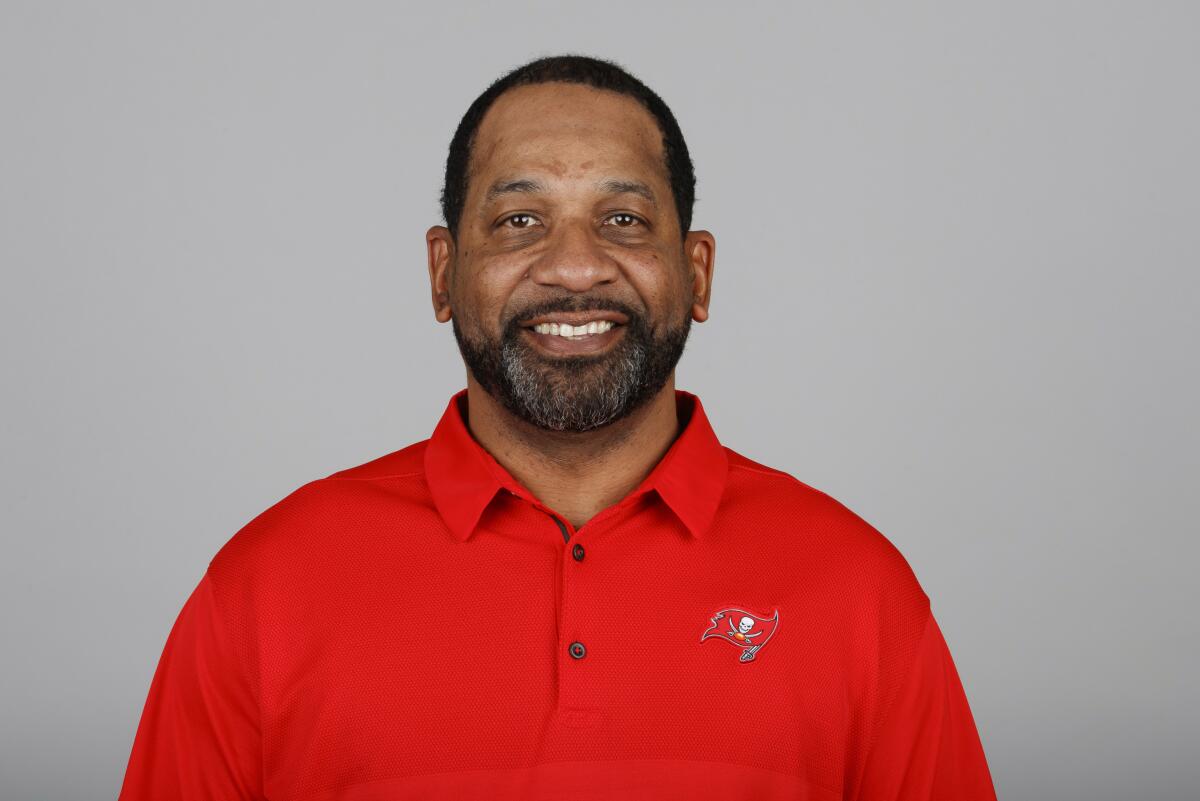Appellate court affirms Todd McNair’s right to a new trial against NCAA

- Share via
An appellate court gave Todd McNair a major victory in his long-running legal fight with the NCAA on Friday, affirming a lower court’s decision to order a new trial in the former USC assistant football coach’s defamation lawsuit against the organization.
The three-justice panel in California’s 2nd District Court of Appeal found that Los Angeles County Superior Court Judge Frederick Shaller didn’t abuse his discretion when he granted McNair’s motion for a new trial.
“The trial court abuses its discretion in ruling on a new trial motion only if there is no reasonable basis for its ruling or the court committed legal error,” the 26-page opinion said. “The NCAA has failed to demonstrate an abuse of discretion.”
In an emailed statement, Bruce Broillet, McNair’s lead attorney, said they are “tremendously pleased” with the decision and their client is “looking forward to holding the NCAA accountable for its actions and to clearing his name.” The NCAA didn’t immediately respond to a request for comment.
McNair, who coaches running backs for the Tampa Bay Buccaneers, is preparing for Sunday’s Super Bowl between the Buccaneers and Kansas City Chiefs.
After the NCAA’s Committee on Infractions ruled in June 2010 that McNair engaged in unethical conduct in connection with star running back Reggie Bush receiving benefits from sports marketers while playing for the Trojans, the coach was saddled with a one-year show-cause penalty. He sued a year later, alleging the NCAA fabricated evidence and essentially left him unemployable in the wake of a scandal that led to historic sanctions against USC.
When the case finally went to trial after being delayed by three trips to the appellate court, an L.A. County Superior Court jury decided in May 2018 that the NCAA hadn’t defamed McNair. But Shaller ordered a new trial in January 2019, finding the jury didn’t have sufficient evidence to support its determination and the group’s foreman, whose law firm worked on one of the appeals in the case for the NCAA, should have been disqualified.
Much of the appellate court’s opinion Friday focused on the alleged late-night phone call in January 2006 between McNair and Lloyd Lake, one of the sports marketers, that the NCAA cited as the foundation of its case to sanction McNair.
“The NCAA acknowledges that the only support for the operative statement’s finding that McNair ‘had knowledge’ of NCAA violations was the late-night call, the so-called ‘linchpin,’ ” the opinion said. “The only evidence adduced about what was said during the late-night call was the transcript of Lake’s interview [with NCAA investigators]. Viewing the transcript along with the inferences the trial court drew according to the required rules … the court reasonably found it did not support the operative statement.”
In the decision granting the new trial, Shaller criticized the interview of Lake by NCAA investigators as “botched” and “sloppy” and “unprofessional.” Lake did not testify at the trial.
“Lake was unsworn, was not subject to the cooperative principle, gave hearsay responses … and was frequently interrupted by the interviewers so that it is difficult to ascertain what question he was responding to,” the appellate opinion said.
“Without support from Lake’s interview, the trial court reasonably found there was no ‘credible basis for the jury to have found’ the statements ‘were other than false.’ The result of the credibility assessment, along with the weight the court gave to, and the inferences it derived from ... is inescapable: McNair’s credible denials render false the operative statement’s assertions that he knew about the NCAA violations, and so McNair carried his burden at trial to prove falsity.”
The soccer teams at UCLA and USC haven’t played competitively in more than a year because of the pandemic. Now their season openers have been delayed.
McNair testified that he wasn’t aware of any NCAA rules violations, couldn’t remember the phone call — the NCAA claimed that’s when he learned about Lake’s benefits to Bush — and didn’t recall ever meeting Lake.
“No amount of circumstantial evidence about interactions between McNair and Lake provided to the trial court what they spoke about or what McNair knew such that it would support the operative statement’s finding that he did know,” the opinion said. “That the two men may have spoken, may have had a celebrity friend in common, and posed for the same photograph are manifestly not evidence that McNair ‘had knowledge of’ the agency and improper benefits, which is the only way his denials would violate NCAA rules.”
The appellate court’s opinion didn’t address the issue with the jury foreman.
The NCAA had also appealed Shaller’s declaratory judgment voiding the show-cause punishment in NCAA bylaws. He found the penalty, which is a key part of the NCAA’s enforcement apparatus, to be an “unlawful restraint” on pursuing a lawful profession.
The three justices said they had no jurisdiction to consider the challenge because they affirmed the order for a new trial.
More to Read
Go beyond the scoreboard
Get the latest on L.A.'s teams in the daily Sports Report newsletter.
You may occasionally receive promotional content from the Los Angeles Times.







